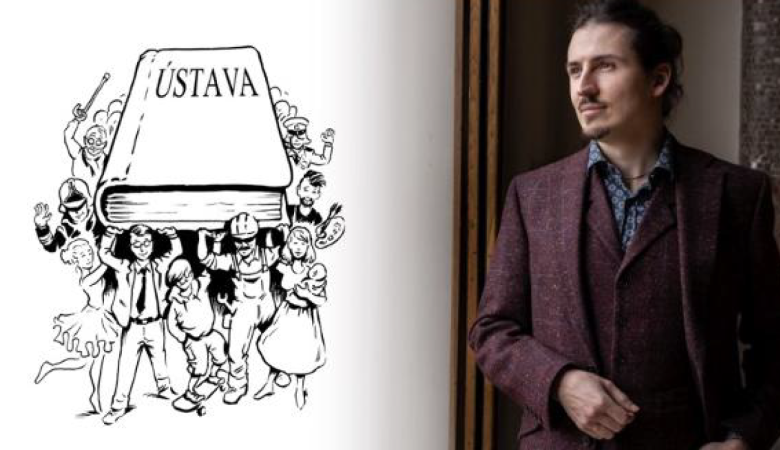Dr. Lukáš Lev Červinka: Combining Law and Sociology

Dr. Lukáš Lev Červinka: Combining Law and Sociology
We have lived in a new state, under a new constitution, for three decades now. Still, the relationship between citizens and the legal basis of their state is not particularly strong. Why that is the case is one of the questions that Lukáš Lev Červinka, doctoral student at the Faculty of Law of Charles University and Ca’ Foscari University of Venice, is trying to answer in his research. Thanks to his interest in the Mediterranean, he compares Czech and Italian constitutional law, and the political parties represented in parliament, combining sociology and law in a unique way. He is also a big advocate of open science and its popularisation. He is now looking for funding to publish a cartoon version of the Constitution of the Czech Republic to bring it closer to secondary school students and the general public. You can support Dr. Červinka’s project here.
There are social and political parallels between the Czech Republic and Italy, and common features in the historical development of both countries. When drafting their current constitutions, their supreme laws, which govern the organisation of the state, both the Czech Republic and Italy had to handle their totalitarian past somehow. These similarities make the two countries perfect for a socio-legal comparison. This is why Lukáš Lev Červinka decided to look into the topic. He learnt Italian and applied to the Venice university. Then, he drafted his Establishment Research Project.
Excluded citizens
“I combine law and sociology. I am interested in how democracy is born, and how it changes and works in different countries. My work is based on Niklas Luhmann’s sociological theories. I study how society sees itself, who belongs, and who does not. The law says that the people are voters, citizens. But the truth is that even if you have citizenship, you are not necessarily part of the people. You might not be considered as part of the political community, and this might push you to the fringes of society. This is how excluded groups, which do not get to contribute to politics or the creation of values at all, are created. I also want to explore the creation and role of the identity of the state. If I studied the issue from the normative perspective, there would be only legal regulations. But I also reflect the sociological aspects, and look into how the state perceives itself, which values it should represent, and how it develops,” explains the Ph.D. candidate.
In his research, Mr. Červinka studies the constitutions of the two states, their development, changes, and also the relationship between legal rules and citizens. Unlike the Czechs, Italians feel very strongly about their constitution. He believes that one of the reasons might be the quick and chaotic creation of the Czech constitution in 1992.
“The constitution was drafted quite quickly and behind closed doors without the public being involved. Regardless of its quality, it was presented to the people as a done deal. The adoption of a new constitution at a time when the country is being divided into two new states against the will of the people is immensely difficult. The atmosphere of the 90s did not contribute to the creation of a relationship between the constitution and the people,” says Červinka, adding that when the Italian constitution was created, it was accompanied by a much wider social debate, which had a positive impact on how the Italians feel about their constitution.
Direct presidential election as a disruption of the system
In the thirty years of its existence, the Czech constitution has been amended eight times, for example, when the Czech Republic was divided into regions, or when it joined NATO and the European Union. The most widely critiqued change was the introduction of the direct presidential election, which, according to lawyers and political scientists alike, disrupted the balance of the constitutional order.
The Italian constitution is 45 years older than the Czech one. Some parts of the constitution have also been amended in response to the changes in society. “The Italians are trying to change the part on the organisation of the state all the time, while the parts dedicated to human rights, and the position of the citizens, have rarely been changed since its adoption. In a stable society, the content and form of the constitution may stay the same for centuries. However, modern societies develop at a rapid pace, and the constitutions must respond. It does not necessarily mean that the wording must be changed. In many cases, the Constitution itself is not amended, but the case-law of the Constitutional and Supreme Court evolves. These two institutions are able to react quite flexibly to changes in society. It is much more dangerous if a constitution becomes a document of the past, deprived of its meaning, than if it is changed often,” explains Červinka.
Constitution as a cartoon
Inspired by the Mediterranean, where there are popular science shows dealing with the constitution broadcast in public media, which are watched by a wide audience, Mr. Červinka is trying to popularise constitutional law in our country. Together with several other scholars, he founded Hermeniculum: Institute of Popular Constitutional Hermeneutics whose aim is to raise awareness about the constitutional system. They are also planning to publish the constitution in the form of a comic book, with the target audience being students at secondary school. “If we have the feeling that democracy is under threat, it is more important than ever to explain comprehensibly the meaning and role of the Constitution of the Czech Republic, constitutional law, and the state. Our aim is to create a simple cartoon for each article of the Constitution – to explain its meaning in images. The book should also include cartoons dealing with the legislative and electoral process. It is one of the ways to bring the constitution closer to people who are not lawyers,” Mr. Červinka explains.
However, the creation of the roughly 400-page book, which should be called SatiriKom: Ústavní (ne)pořádek v obrazech [SatiriCom: Illustrated Constitutional (Dis)order] has not been easy, since funding is difficult to find. Even though the team is supported by the Rector of Charles University, Professor Milena Králíčková, and the Dean of the Faculty of Law, Professor Radim Boháč, it is not possible to use any research grant for the popularisation of law in this form, and finding a private investor for a non-profit project is complicated.
Money for popularisation
Mr. Červinka is an advocate for the popularisation of science. He notes that it is often the only way the public can see behind the thick doors of research centres and labs even though they are often funded by taxpayers’ money. This is definitely a valid reason to explain the meaning of research and its results to the public.
This is one of the reasons why Mr. Červinka is a big supporter of open science and open access publications. They also benefit interdisciplinarity, which is in great demand these days. “There is nothing more discouraging from getting involved in another field than if you find out that you can’t read a sociological article because your faculty only subscribes to legal and political science journals. If you deal with these problems on a daily basis, you start losing motivation to go beyond your field of study,” he says sadly.
Citizens vs. corporations
The doctoral student has not been charmed only by Italy. He also draws inspiration from films and literature, especially sci-fi and fantasy. The average audience and readers might not often realise that law plays an important role in these genres. In most dystopian and utopian works, the legal system of the society is always at least hinted at.
“It reflects and affects our perception of law in our real society. It is an alternative to what is thinkable, what is possible, what is desired, and what should be feared. For many years, dystopian novels about the omnipotent state controlling its citizens and the bureaucracy suppressing them were very popular. But then, the state was replaced by corporations ruling society, and owning the people and their lives. In the past, citizens had to be protected against the state. That is why catalogues of human rights were created. However, constitutional law in most countries froze at this point, and fails to reflect that individuals are no longer threatened by the state, which is becoming more and more powerless, but by large corporations.”
Author: Helena Zdráhalová
Photo: Michal Novotný
The author of one of the illustrations from the comic book is Karel Jerie.







